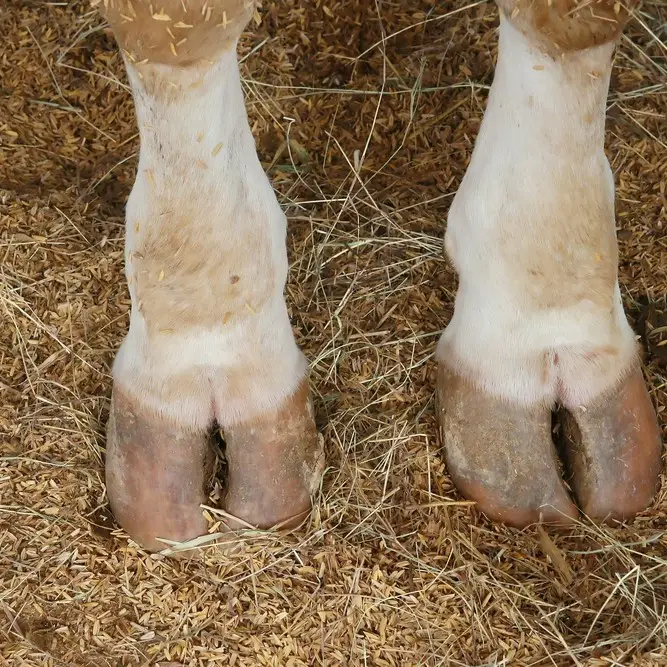Cow hooves are a popular natural dog chew, but are they safe for your furry friend? In this article, we will explore the benefits, downsides, and risks of cow hooves for dogs. Let’s dive in and find out if cow hooves are a suitable treat for your canine companion.
What Are Cow Hooves?
Cow hooves are made from the feet of cattle, which are considered a by-product of the meat industry. The hooves are removed from the rest of the foot, cleaned, cooked, and air-dried to create a tasty chew for dogs. Some cow hooves may also be filled with a meaty paste to make them more enticing.
Provenance
Cow hooves have various uses besides dog chews. They can be used to make tallows, fertilizers, and even foam for fire extinguishers. However, it’s important to note that cow hooves are not a normal part of a cow’s diet and are primarily used as treats for dogs.
Preparation
To ensure safety and palatability, cow hooves undergo a process of cleaning, cooking, and air drying. This process makes the hooves suitable for chewing. They become naturally hollow and may sometimes be filled with a meaty paste.
Benefits of Cow Hooves for Dogs
Long-Lasting
Cow hooves are made of keratin, a tough protein that provides a challenge for even the most enthusiastic chewers. This makes them a long-lasting option for dogs. However, it’s important to note that there are potential risks to dogs’ teeth, which we’ll discuss later.
Single Protein Source
Cow hooves, when not filled with other pastes, usually contain a single source of animal protein. This can be beneficial for dogs with certain dietary restrictions or sensitivities. However, there is a possibility of cross-contamination with other proteins during the manufacturing process, so be cautious if your dog has severe allergies.
Lower Fat Content
Compared to other types of chews or treats, cow hooves generally have a lower fat content. However, the fat content can vary among different brands, so it’s important to check the packaging for your dog’s specific treat.
Nutritional Information for Cow Hooves
Protein
Cow hooves are often claimed to be “high in protein,” but this can be misleading. While they do contain protein, most of it is in the form of keratin, which is difficult for dogs to digest. Therefore, keratin is not a significant source of protein for dogs.
Fats
Cow hooves may contain some fat, especially if they have a meaty filling. However, these fats are not of high quality, nutritionally speaking, and primarily add calories to the treat.
Vitamins, Minerals & Compounds
Cow hooves have a minimal amount of vitamins and minerals that are not easily digested by dogs. As long as your dog is already on a complete and balanced diet appropriate for their age and breed, they should not require additional vitamins or minerals from cow hooves.
Feeding Guide
Cow hooves should only be given as an occasional treat, ideally no more than once a week. It’s important to keep treat intake low, so treats or table scraps should not exceed 10% of your dog’s daily food intake by weight.
Downsides & Risks of Cow Hooves for Dogs
Dental Damage
Chewing on hard cow hooves can potentially damage a dog’s teeth. To determine if a chew is safe, try pressing your nail into it – if it leaves a dent, the chew is soft enough. If the cow hooves you have purchased are too hard, consider soaking them in water to soften them before giving them to your dog.
Choking Hazard
Cow hooves are solid, and if dogs try to swallow them too quickly, they may get stuck in their throat or food pipe. This can cause serious health issues, including choking, and may even be fatal. Always supervise your dog while they enjoy cow hooves and ensure they don’t attempt to swallow large pieces.
Intestinal Blockage
Smaller pieces of cow hooves that are swallowed without proper chewing can cause blockages in the stomach or small intestines. As cow hooves are difficult to digest, prompt veterinary attention is necessary to prevent complications if an intestinal blockage occurs.
Avoid If…
- Your dog has untreated dental issues.
- Your dog is known to chew and swallow food quickly.
- Your dog has food sensitivities or allergies.
Alternatives to Cow Hooves for Dogs
If you’re looking for alternatives to cow hooves, consider the following options:
- Other meaty chews, such as tripe sticks, may have a higher nutritional value and are easier for dogs to digest. However, they should still be considered treats and not exceed 10% of your dog’s diet.
- The Veterinary Oral Health Council has an accepted list of chews that are safer for your dog’s teeth.
Frequently Asked Questions
Coming Soon
Conclusion
While cow hooves can provide dogs with a long-lasting and single protein source chew, they also come with risks. It’s important to consider your dog’s dental health, chewing habits, and any allergies before introducing cow hooves as a treat. Always supervise your dog during chewing and consult with your veterinarian if you have any concerns. Remember, your pup’s safety and well-being should always come first.
For more information on dog treats and chews, visit Pawsoha – your trusted source for everything dog-related.
